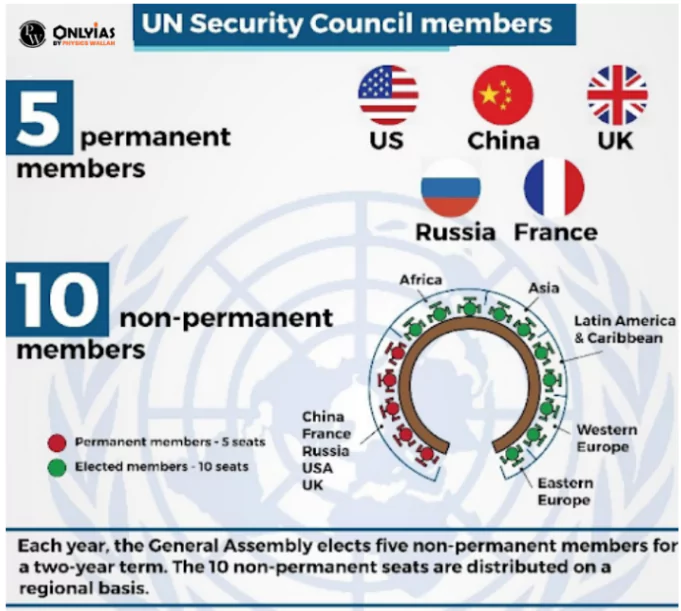The United Nations General Assembly (UNGA) adopted a “Pact for the Future” which calls for the expansion of the UNSC, to make the body more representative of the 21st century.
About “Pact for the Future”
- Pact for the Future: A “landmark declaration” adopted by the UNGA to enhance global governance, accelerate sustainable development, and address key international issues.
- Objective: To make the UN more relevant and effective in the 21st century, addressing criticisms of the organisation’s failure to prevent conflicts and enforce accountability.
Enroll now for UPSC Online Course
Key Components
- Sustainable Development Goals (SDGs): The pact reaffirms commitment to speeding up progress towards achieving the SDGs and the Paris Climate Agreement.
- Human Rights and Gender Equality: Strengthens commitments to human rights, with a focus on women’s rights and protection of vulnerable populations during humanitarian crises.
- Conflict Resolution and Peacekeeping: Calls for reviewing UN peacekeeping operations and addressing the root causes of conflicts.
- Disarmament: Promises to revitalise efforts toward nuclear and biological weapons disarmament, though details remain rhetorical.
- Digital and Future Generations:
- Global Digital Impact: Focuses on regulating artificial intelligence (AI).
- Declaration on Future Generations: Aims to secure the well-being of future generations by aligning national and international decision-making accordingly.
Challenges and Criticisms
- Lofty Goals, Thin Implementation Plans: The pact outlines ambitious objectives (e.g., ending hunger, achieving gender equality, protecting the environment) but lacks clear, actionable steps for implementation.
- Security Council Reforms: Pledges to address historical injustices against Africa and improve representation for Asia-Pacific, Latin America, and the Caribbean in the UNSC.
- However, no specific roadmap is provided for speeding up reforms.
- Financial Architecture: Calls for reform of international financial systems and responses to global shocks, but concrete steps are missing.
Opposition
- Countries in Opposition: Russia, Iran, North Korea, Belarus, Syria, and Nicaragua opposed the pact, citing concerns over national sovereignty and the influence of external entities on domestic affairs.
- Amendments: Russia proposed amendments to assert intergovernmental decision-making and to prevent UN intervention in domestic matters, which were rejected by the majority of UN members.
Check Out UPSC NCERT Textbooks From PW Store
About United Nations Security Council
The United Nations Security Council, established under the UN Charter in 1945, constitutes one of the UN’s six principal organs.

- First Session: It held its first session on 17th January 1946 in Westminster, London.
- Headquarters: New York City
- Mandate: It has primary responsibility, under the UN Charter, for the maintenance of international peace and security.
- Members: Comprising 15 members, it includes 5 permanent members (P5) and 10 non-permanent members elected for two-year terms.
- Permanent members: They are the United States, Russian Federation, France, China, and the United Kingdom.
- 10 non-permanent Members: Seats are distributed on a regional basis:
- Five for African and Asian States
- One for Eastern European States
- Two for the Latin American and Caribbean States
- Two for Western European and other States
- An informal understanding reserves one seat for an Arab country in the Africa-Asia group.
Election of Non-Permanent Members
- Each year the Members of UNGA elects five non-permanent members for a two-year term at the UNSC, with five replaced each year.
- To be approved, a candidate must receive at least two-thirds of all votes cast for that seat, which can result in deadlock if there are two roughly evenly matched candidates.
- A retiring member is not eligible for immediate re-election.
|
- Decision Making: Decisions of the Security Council are binding
- Majority: It must only be passed by a majority of nine out of the 15 members, as well as each of the five permanent members.
- “Veto power”: It refers to the power of the permanent member to veto (Reject) any resolution of the Security Council.
- Criticism: The unconditional veto possessed by the five governments has been seen as the most undemocratic character of the UN.
- Critics also claim that veto power is the main cause for international inaction on war crimes and crimes against humanity.
- Supporters of the Veto Power: They regard it as a promoter of international stability, a check against military interventions, and a critical safeguard against U.S. domination.
- Chapter VI of the UN Charter: When the Security Council considers a threat to international peace, it first explores ways to settle the dispute peacefully under Chapter VI
- Chapter VII of the Charter: Council can also take measures to enforce its decisions.
- It can impose economic sanctions or order an arms embargo.
- On rare occasions, the Security Council has authorised member states to use all necessary means, including collective military action, to see that its decisions are carried out.
Enroll now for UPSC Online Classes
![]() 24 Sep 2024
24 Sep 2024
